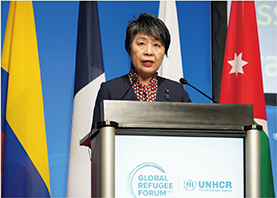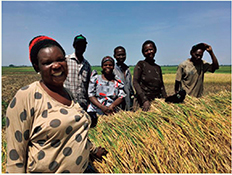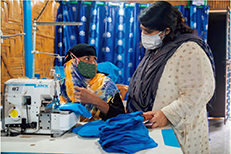ODA Topics 2
The Second Global Refugee Forum
– Co-Convenor Japan’s Effort –

Foreign Minister Kamikawa making a statement at the opening ceremony of the Second Global Refugee Forum

Refugees and the people in the host community participating in a rice cultivation workshop in Uganda (Photo: JICA)

Displaced women in Bangladesh receiving sewing skill training as part of self-reliance support, conducted by UNIQLO in collaboration with UNHCR (Photo: Fast Retailing Co., Ltd.)
The number of forced displacements has more than doubled in the last decade, and the number of people forced to leave their homes exceeded 100 million for the first time in 2022.Note 1 This surge is due to prolonged man-made conflicts around the world. While refugees are still unable to return to their home countries, new crises such as Russia’s aggression against Ukraine are causing more outflows. Recent intensified natural disasters caused by climate change have further worsened this situation.
In 2018, the Global Compact on Refugees (GCR) was adopted by the UN General Assembly as a new international framework for refugee assistance. Its aims were; (1) to ease the pressures on host countries, (2) to enhance refugee self-reliance, (3) to expand access to third country solutions, and (4) to support conditions in countries of origin for return in safety and dignity. The Global Refugee Forum (GRF) is a follow-up meeting to the GCR that is held every four years, with the aim of sharing efforts to resolve refugee issues and encouraging cooperation among the international community. The first meeting was held in December 2019.
The second GRF was held in December 2023, with more than 4,200 participants from countries and regions around the world, and Foreign Minister Kamikawa attended from Japan, which served as a co-convenor along with France, Colombia, Jordan, and Uganda.
At the opening ceremony of the second GRF, Foreign Minister Kamikawa stressed in her statement that to halt the worsening humanitarian situation, we must all envision a future where each and every refugee and displaced person can have opportunities to work hard to make their dreams come true. She pointed out that women and children are particularly vulnerable among refugees and displaced persons, and that the concept of Women, Peace and Security (WPS)Note 2 is essential when addressing forced displacement. She also explained Japan’s efforts to support the self-reliance of the displaced both overseas and within Japan, and to ease the pressures on host countries. Moreover, the Minister strongly called for greater unity and cooperation in the international community, and announced that Japan would expand the efforts of the Humanitarian-Development-Peace (HDP) NexusNote 3 as a platform for collaboration among the international community.
Foreign Minister Kamikawa held bilateral meetings with refugee host countries of Jordan, Lebanon, Iran, and Uganda, which participated in the GRF. Minister Kamikawa highly valued the fact that these countries contribute to peace and stability in the region by receiving many refugees despite their own difficulties, and announced the intention of the Government of Japan to strengthen support to ease the pressures on the respective countries. At the bilateral meeting between Japan and France, the two foreign ministers concurred to further strengthen cooperation under an “Exceptional Partnership,” by following up on the Roadmap on Japan-France Cooperation issued by the leaders of the two countries.
Japan organized a dialogue with representatives from international organizations on the occasion of the GRF, titled “WPS + Innovation – from the field of humanitarian aid especially for refugees and internally displaced persons (IDPs).” Foreign Minister Kamikawa heard from the representatives of the International Organization for Migration (IOM), the United Nations High Commissioner for Refugees (UNHCR), the International Committee of the Red Cross (ICRC), and the International Federation of Red Cross and Red Crescent Societies (IFRC) about the challenges they face on the ground and asked about the role they expect from Japan. Foreign Minister Kamikawa stated that she would like to apply WPS specifically to the current situation in Ukraine and the Middle East, as well as issues faced by countries in Africa and Latin America, while applying the knowledge gained from the international organizations to future international assistance from the perspective of WPS.
The second GRF recommended that multiple countries and organizations form multi-stakeholder pledges (MSP) for various types of support and work together under the pledges. A total of 43 MSPs were announced in areas such as HDP nexus, gender equality, peacebuilding, and education, which will be led by the lead countries and organizations of each MSP over the next four years.
Note 1: UNHCR “Global Trends Report 2022” https://www.unhcr.org/global-trends-report-2022
Note 2: See Part III, Section 3 (6).
Note 3: See Note 38.
